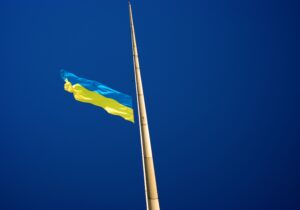It is unclear what year of the war this is, for it is unclear when the war even started. Perhaps this war has always existed—or so it seems. But if pressed to offer a date or an event, perhaps one could say that this war started with Stalin’s Holodomor policies of starving the region in the 1930s. Or with the extensive Russification policies after the Great Patriotic War. Or maybe, more recently, it started with retaliation in response to the Maidan revolution of 2014. Whatever the case, it seems certain that Russia’s war against Ukraine did not begin in February 2022, although a new more concerted and conspicuous invasion did.
In the sixteenth year of the Peloponnesian War, the Athenians sailed to the small island-state of Melos, once a colony of Lacedaemon, but long since an independent state. The war has been raging all over the Greek world since the days of Pericles, now long gone, himself dead of the dreadful plague that the war occasioned in Athens. Tiny Melos alone, its shores lovingly lapped by the waves of the Aegean, finding safety and anonymity in its smallness, powerlessness, and distance from all others, had to that point managed to avoid the war. Wisely it stayed neutral, assuming that neutrality and anonymity would preserve it from the fate of the rest of the Greek world. Even so, though Melos was not interested in the war, the war was interested in Melos. And so, the Athenians arrived, an invasion pretending to be a mission of diplomacy.
Tanks rolling over a border do not strike one as an auspicious start to diplomatic talks—especially if done without prior warning or a formal declaration of war. But that is what happened in late February 2022, shocking all, but none more than Ukrainians. For what is the point of systematically ravaging villages, attacking defenseless civilians, torturing the elderly, and opening fire on cars with families trying to get away? And what is the point now, almost two years on, of intensifying attacks on civilians, of repeatedly bombing such obviously non-military targets as residential apartment buildings, maternity hospitals, and shopping plazas?
But then, what is the point of arriving at a small island with an army, without prior warning or declaration of war, and demanding unconditional surrender, even as said island had not been part of the war beforehand?
Might makes right is the oldest natural law there is in a world apart from Christianity. It is this law that governs the actions of war elephants on a rampage, catapults and other mighty machines threatening city walls, missiles launched into desperate cities under siege, and tanks crushing all under foot. The Athenians relied on this law—and felt no qualms telling so to the Melians. It is ever this way in nature, the Athenians states matter-of-factly: the strong do as they will, and the weak must submit.
For Ukrainians now, just as was the case for the Melians, one could say that there is always a choice. But the choice is all too clear: surrender or die. Although, it is increasingly noticeable, surrender too can lead to sure death. Because there can be no true diplomacy, no conversations when missiles rain down.
The Melians, it seems, either understood this and were willing to take a chance to preserve their freedom, or maybe they were too naïve to imagine that the worst would truly come to pass. Their final response to the Athenians, according to Thucydides, was to keep trusting in proper diplomacy:
We will not in a moment deprive of freedom a city that has been inhabited these seven hundred years; but we put our trust in the fortune by which the gods have preserved it until now, and in the help of men, that is, of the Lacedaemonians; and so we will try and save ourselves. Meanwhile we invite you to allow us to be friends to you and foes to neither party, and to retire from our country after making such a treaty as shall seem fit to us both.
The Melians’ open assertion to keeping their own liberty is a slap in the face to the Athenian claim for the preceding century that they were the liberators of the Greeks—and during the Persian Wars in the early fifth century, they were. But how far they had come from those days. The liberators of old had made an empire for themselves by threatening small states into tribute-paying alliances, if we want to use a milder word for what truly happened.
Likewise, Putin’s righteous slogans of “Liberate the Donbas” or of fighting for the denazification of Ukraine, are but a transparent veneer for a power trip of a tyrant who will never be satisfied. As writer Sasha Vasilyuk, and immigrant who has relatives in Russian-occupied Donetsk, has noted, “Putin will get whatever result he wants,” because he can.
So did the Athenians in 416 BC. They got the result they wanted:
The next winter… the Melians surrendered at discretion to the Athenians, who put to death all the grown men whom they took, and sold the women and children for slaves, and subsequently sent out five hundred colonists and inhabited the place themselves.
And yet, the natural law on which the Athenians of 416 BC or Putin of the twenty-first century rely has a second part to it. Yes, the first part is: might makes right, so the strong do what they will. But the second part, Thucydides reminds us, is that for every might there is a stronger, more powerful one yet. Sometimes that stronger might that will level the haughty will come as a result of their own hubris.
So it is with Athens. After destroying Melos, the Athenians decided—while in the middle of a major war at home—to launch a new all-out campaign abroad to conquer the massive island Sicily. Yes, this is a good reminder that everyone, ancient Greeks included, needs to pay better attention to geography. But the bigger lesson at hand, as Thucydides not-so-subtly suggests with this narrative arrangement, is comeuppance. Expansionist powers justified exclusively by power do not last because violently enforced self-interest is not a firm foundation of society or government. The once strong defeat themselves with their own pride. And yet, how many innocent lives do they destroy in the process?
On the one hand, this war has shown the powerlessness of earthly rulers to constrain the violence of earthly tyrants. On the other hand, we know that a just God cares about justice, and cares about the suffering of innocents. Still, the question “How long, oh Lord?” seems as appropriate now as it has been to many believers in earlier times, going back to the Psalms. In early 2023, John Burger published a book-length interview with the leader of the Ukrainian Eastern Catholic Church, Major Archbishop Sviatoslav Shevchuk, appropriately titled At the Foot of the Cross. Burger summarizes his takeaways from these conversations: “Perhaps no words from the Gospel, then, meant more to Ukrainian Christians in 2022—and now—than those of Jesus, who said ‘Whoever wishes to come after me must deny himself, take up his cross, and follow me’ (Mt 16:24).”
As we begin 2024 watching the horrifying civilian toll in intensified air strikes that Moscow is launching on Ukrainian cities, this holds no less true than it did a year ago.







 Sponsor a student for Christianity & National Security 2024
Sponsor a student for Christianity & National Security 2024